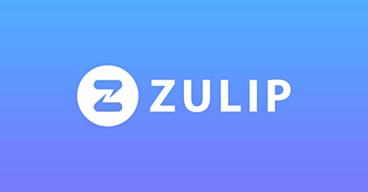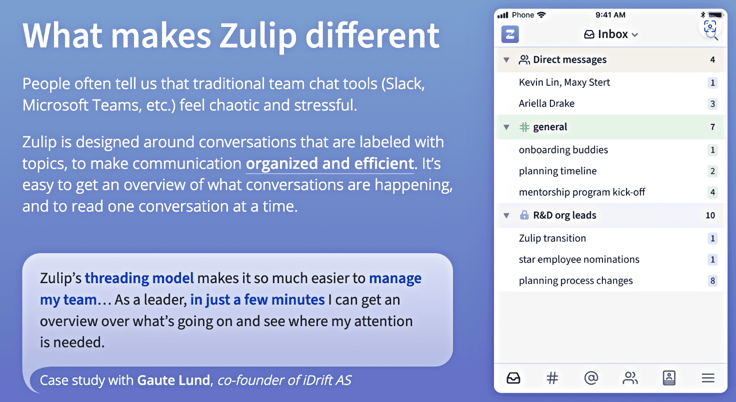
TL; DR: For remote and hybrid teams, an organization’s chat channel is the lifeline for communication…but staying updated can be challenging amid the volume of messages. Enter Zulip: a structured team chat solution with thread-based organization, unlike popular apps like Slack that use channel-based systems. Alya Abbott, the Head of Product, told us how Zulip simplifies messaging for growing organizations by promoting seamless collaboration across projects and time zones — without unwanted fragmentation.
If you’re like me, you’re part of several group chats with different friends. Some may have been created out of necessity, while others were born from one-time inside jokes that just stuck around.
But there have been many times when I’ve missed an hour of chatting and felt utterly lost — whether it’s a life update, some drama, or plans being made, I’m suddenly faced with 78 new messages. I then have two options: Ask what I missed, or take the hit and scroll back to catch up.
The worst is when this happens at work: Stepping away from Slack for a couple of hours to enter Deep Work Mode, only to return to a flood of updates, some of which are time-sensitive.
Zulip is an organized team chat solution that alleviates the stress and anxiety of missing important updates, dozens of messages, or assigned tasks. It differentiates itself through thread-based modeling.

“What this ends up doing is radically transforming how you read the information you need and get that information,” said Head of Product at Zulip, Alya Abbott.
Zulip lets you communicate asynchronously, ensuring that one conversation doesn’t disrupt others. It’s also an excellent solution for teams collaborating across different time zones or team members who don’t keep their chat app open all day, allowing them to return to conversations later with seamless continuity.
“People work collaboratively these days, whether remotely or from different locations,” Alya added. “Our app was designed to eliminate the chaos and stress from communication — saving both the emotional load and your time.”
A Smart Team Chat Redefining Productivity
Zulip was inspired by the stress that often accompanies the numerous conversations in hybrid or remote teams.
Founded in 2012 by MIT alumni (who previously developed Ksplice, a rebootless update service for Linux acquired by Oracle in 2011), Zulip has earned the trust of Fortune 500 companies and is recognized as a premier open-source chat and collaboration platform. As a top alternative to Slack, Zulip boasts more than 80,000 commits from 1,455 contributors.
Small experiences like being overwhelmed by missed messages or wanting to revisit a topic but feel it’s too late can add significant stress to your day.
It can start feeling like a snowball effect.
But unlike Slack, which uses a channel-based approach, Zulip supports threaded conversations and inline replies, allowing for more structured (and flexible) communication.
“Offering this type of flexibility is crucial for companies, especially if they want to attract and retain top talent, given the diverse situations people face,” said Alya. “We’ve seen a significant trend where people recognize the value of this flexibility in their work.”

Unfortunately, those working in a different time zone from most of their team can unintentionally be excluded from discussions or decision-making processes that have already begun.
Zulip solves this by allowing anyone to join a conversation hours or even days later, ensuring all stakeholders and team members can participate and keep the discussion moving forward.
Users can effortlessly share images, links, and file attachments, too. Messages on Zulip can be sent in plain text or formatted stylistically: For example, simply use the formatting buttons or directly use Markdown (e.g., * for bulleted lists and > for quotes).
The platform also supports 130+ native integrations with hundreds of additional integrations through Zapier, including popular web apps such as Asana, Dropbox, Github, and Instagram.
Where Privacy Meets Control and Flexibility
Privacy is crucial for specific industries, especially following Slack’s recent privacy policy update. Its vague policy implied customer data, including messages, content, and files, could be used to train its global AI and large language models (LLMs).
This raised concerns among users because chat messages often contain sensitive company data, and LLMs can potentially leak the data they are trained on. In response to the ensuing backlash, Slack agreed to update its principles to clarify that it does not develop LLMs using customer data.
Self-hosting tools like chat apps can better protect your sensitive private data — which is what Zulip offers.
In fact, you can choose from cloud hosting or self-hosting, depending on the type of flexibility your organization requires:
- Cloud hosting: Cloud hosting is an easy option for those with limited IT expertise. Like other web apps, it allows for a hands-off approach, where your data is hosted externally and managed entirely by Zulip’s infrastructure and servers.
- Self-hosting: For organizations where privacy and security are critical (like healthcare or finance), self-hosting with Zulip is the best option. You have complete control over your data and can host it securely behind your firewall. You manage installation, backups, and maintenance with flexible deployment options.
“We make it easy to migrate between cloud and self-hosted options. You can export your data and move it to the cloud or transfer it from the cloud to a self-hosted server,” Alya said. “If you’re not satisfied with the cloud service at any point, you can always switch to self-hosting and manage your data as you prefer.”
Customization is another feature Zulip excels at that other chat apps don’t. As a 100% open-source platform, it allows users to fully modify the software to suit their needs, providing complete transparency by letting them see and adjust the code they’re running at any time.
“Being open-source gives our users a lot of visibility into where we’re going with the product. They can also provide input directly,” Alya added. “The open-source approach allows community engagement and openness that improves the product overall for everybody involved.”
Future Vision for Improved UI/UX
The Zulip team is tirelessly working on many new features and improvements. One major area of improvement involves the web app UI.
While many users praise Zulip for its simplicity and ease of use, the app is undergoing a visual redesign for an even better UX. The redesign is already underway, so users will continue seeing improvements through updates and patches.
The community often inspires updates like these. Alya recalled one user request that recommended Zulip add a feature to search topics in the left sidebar. The suggestion was proposed in the dev community and was implemented within a week.

Secondly, the team is focused on simplifying the onboarding process for new Zulip users.
Given Zulip’s unique structure compared to Slack and Teams, transitioning from another organization could definitely present a learning curve.
But an enhanced onboarding experience lets organizations bring on new hires without that pesky learning curve. Both new and existing team members can quickly learn and adapt to changes, whether accessing training materials or catching up on updates missed during off-hours.
“Zulip serves as a self-documenting knowledge base of your organization’s decisions and the rationale behind them,” Alya explained, “so new team members can refer to this information and understand why and how certain decisions were made as they occurred.”
Whether you prefer cloud or self-hosting, Zulip offers a freemium solution. The free Cloud version provides access to 10,000 searchable messages and 5 GB of storage. Upgrading to the Standard or Plus Cloud plans, priced between $7 and $10 per user per month, unlocks unlimited features.
For self-hosting, Zulip offers four plans: Free (up to 10 users with all features), Basic ($3.50 per user per month with all features), Business (minimum 25 users, around $7 per user per month, with all features plus unlimited chat and email support), and Enterprise, with custom pricing.
Learn more about Zulip today — or better yet, see it in action yourself.



